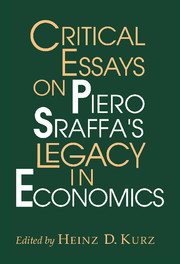Book contents
- Frontmatter
- Contents
- Preface
- List of contributors
- Part I Introduction
- Part II Returns to scale, demand, money and interest, and the classical tradition
- Part III Long-period theory and the problem of capital
- 7 The capital theory controversy
- 8 Wicksell and Douglas on distribution and marginal productivity
- 9 On the probability of re-switching and capital reversing in a two-sector Sraffian model
- Part IV Intertemporal equilibrium theory and the problem of capital
- Mathematical Note by Michele Tucci
- Author index
- Subject index
7 - The capital theory controversy
Published online by Cambridge University Press: 05 June 2012
- Frontmatter
- Contents
- Preface
- List of contributors
- Part I Introduction
- Part II Returns to scale, demand, money and interest, and the classical tradition
- Part III Long-period theory and the problem of capital
- 7 The capital theory controversy
- 8 Wicksell and Douglas on distribution and marginal productivity
- 9 On the probability of re-switching and capital reversing in a two-sector Sraffian model
- Part IV Intertemporal equilibrium theory and the problem of capital
- Mathematical Note by Michele Tucci
- Author index
- Subject index
Summary
Sraffa played a key role in the ‘capital theory controversy’ that arose in the 1960s. Involving economists centred primarily in Cambridge, US (more particularly at MIT), and in Cambridge, UK (though, of course, involving economists from elsewhere), the capital theory controversy has, for some, meant the abandonment of neoclassical economics, while for others it has been a tempest in a teapot occasioned by some prominently published errors but necessitating only minor alterations to the core of neoclassical economics. While the fervour of the debate has passed since the mid-1960s and early 1970s, its meaning and ramifications remain muddy to most economists. It is my hope that the perspective gained by the passage of time can help clarify the issues involved. To that end, I will begin with a brief sketch of the historical background of the controversy, and will then summarize what we have learned. Rather than explore numerous dead-end paths, my focus will be on those results that, in my opinion, remain important today. These are few enough, so my message will be concise. I will conclude by suggesting a broader view of the matter that raises some questions about the appropriate role of assumptions and approximations in economic science.
The controversy begins, for our purposes, in Cambridge, UK, with the publication of (i) Piero Sraffa's Production of Commodities by Means of Commodities in 1960, and (ii) Joan Robinson's Essays in the Theory of Economic Growth in 1962.
- Type
- Chapter
- Information
- Critical Essays on Piero Sraffa's Legacy in Economics , pp. 305 - 314Publisher: Cambridge University PressPrint publication year: 2000
- 14
- Cited by



